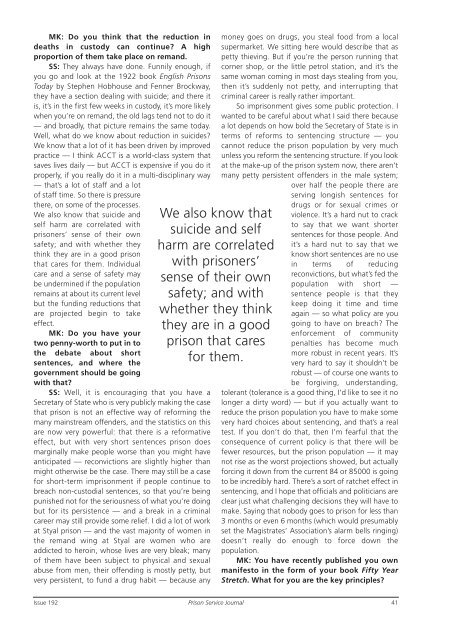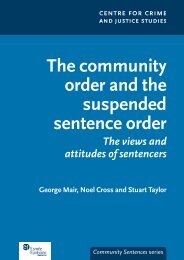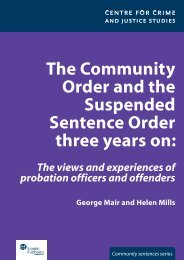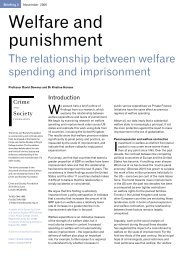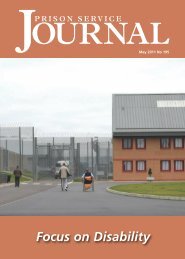PRISON SERVICE
PRISON SERVICE
PRISON SERVICE
- No tags were found...
Create successful ePaper yourself
Turn your PDF publications into a flip-book with our unique Google optimized e-Paper software.
MK: Do you think that the reduction indeaths in custody can continue? A highproportion of them take place on remand.SS: They always have done. Funnily enough, ifyou go and look at the 1922 book English PrisonsToday by Stephen Hobhouse and Fenner Brockway,they have a section dealing with suicide; and there itis, it’s in the first few weeks in custody, it’s more likelywhen you’re on remand, the old lags tend not to do it— and broadly, that picture remains the same today.Well, what do we know about reduction in suicides?We know that a lot of it has been driven by improvedpractice — I think ACCT is a world-class system thatsaves lives daily — but ACCT is expensive if you do itproperly, if you really do it in a multi-disciplinary way— that’s a lot of staff and a lotof staff time. So there is pressurethere, on some of the processes.We also know that suicide andself harm are correlated withprisoners’ sense of their ownsafety; and with whether theythink they are in a good prisonthat cares for them. Individualcare and a sense of safety maybe undermined if the populationremains at about its current levelbut the funding reductions thatare projected begin to takeeffect.MK: Do you have yourtwo penny-worth to put in tothe debate about shortsentences, and where thegovernment should be goingwith that?SS: Well, it is encouraging that you have aSecretary of State who is very publicly making the casethat prison is not an effective way of reforming themany mainstream offenders, and the statistics on thisare now very powerful: that there is a reformativeeffect, but with very short sentences prison doesmarginally make people worse than you might haveanticipated — reconvictions are slightly higher thanmight otherwise be the case. There may still be a casefor short-term imprisonment if people continue tobreach non-custodial sentences, so that you’re beingpunished not for the seriousness of what you’re doingbut for its persistence — and a break in a criminalcareer may still provide some relief. I did a lot of workat Styal prison — and the vast majority of women inthe remand wing at Styal are women who areaddicted to heroin, whose lives are very bleak; manyof them have been subject to physical and sexualabuse from men, their offending is mostly petty, butvery persistent, to fund a drug habit — because anyWe also know thatsuicide and selfharm are correlatedwith prisoners’sense of their ownsafety; and withwhether they thinkthey are in a goodprison that caresfor them.money goes on drugs, you steal food from a localsupermarket. We sitting here would describe that aspetty thieving. But if you’re the person running thatcorner shop, or the little petrol station, and it’s thesame woman coming in most days stealing from you,then it’s suddenly not petty, and interrupting thatcriminal career is really rather important.So imprisonment gives some public protection. Iwanted to be careful about what I said there becausea lot depends on how bold the Secretary of State is interms of reforms to sentencing structure — youcannot reduce the prison population by very muchunless you reform the sentencing structure. If you lookat the make-up of the prison system now, there aren’tmany petty persistent offenders in the male system;over half the people there areserving longish sentences fordrugs or for sexual crimes orviolence. It’s a hard nut to crackto say that we want shortersentences for those people. Andit’s a hard nut to say that weknow short sentences are no usein terms of reducingreconvictions, but what’s fed thepopulation with short —sentence people is that theykeep doing it time and timeagain — so what policy are yougoing to have on breach? Theenforcement of communitypenalties has become muchmore robust in recent years. It’svery hard to say it shouldn’t berobust — of course one wants tobe forgiving, understanding,tolerant (tolerance is a good thing, I’d like to see it nolonger a dirty word) — but if you actually want toreduce the prison population you have to make somevery hard choices about sentencing, and that’s a realtest. If you don’t do that, then I’m fearful that theconsequence of current policy is that there will befewer resources, but the prison population — it maynot rise as the worst projections showed, but actuallyforcing it down from the current 84 or 85000 is goingto be incredibly hard. There’s a sort of ratchet effect insentencing, and I hope that officials and politicians areclear just what challenging decisions they will have tomake. Saying that nobody goes to prison for less than3 months or even 6 months (which would presumablyset the Magistrates’ Association’s alarm bells ringing)doesn’t really do enough to force down thepopulation.MK: You have recently published you ownmanifesto in the form of your book Fifty YearStretch. What for you are the key principles?Issue 192 Prison Service Journal41


